Posts by Christopher Lochhead
068 Behind The Mic: Inside The 1st Marketing PodStorm / Jaime Jay, Jason Defillippo & Christopher Lochhead
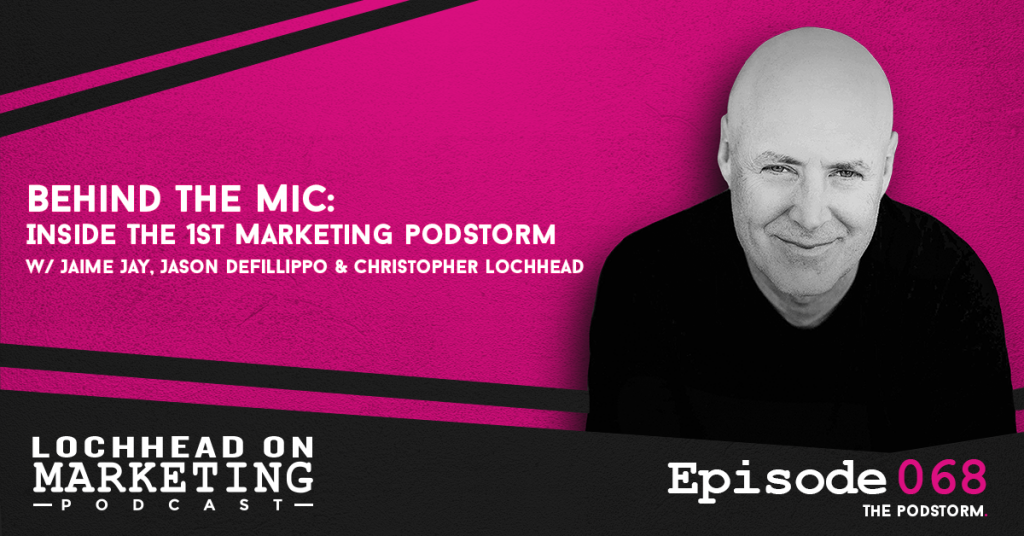
Podcast (lochheadonmarketing): Play in new window | Download (Duration: 39:01 — 26.8MB) | Embed
Subscribe: Apple Podcasts | Spotify | RSS | More
We are on our 30th episode of the World’s First PodStorm! We would like to thank everyone who went through the storm with us! Today, Lochhead on Marketing producers Jason DeFillipo and Jaime Jay joins us and takes us behind the mic. We go deep into the challenges, the wins, and the lessons in creating this PodStorm. We talk about a lot of other matters which you’ll find relatable!Challenges with Production
Making a podcast comes with its challenges, even more so if it’s the world’s first 30-day PodStorm. Timing is one of the main challenges in production. Jason DeFilippo shares that the hard part was dealing with unplanned life events. He seriously advises anyone to take this into account if they want to pursue podcasting. Although they faced challenges, this 30-day marketing discussion proved that the Podstorm is a new category of a podcast activity.“It is basically a roadmap for anyone who wants to do any kind of marketing in their business.” – Jaimie Jay
Category Design
Christopher mentions that Podstrom is all about marketing and category design. The PodStorm encourages marketers to create their category and to differentiate themselves in a niche that they can own. They discussed further category design and rising above the challenges despite the situation the world is at.“In the midst of the greatest economic crisis and the greatest healthcare crisis of the modern era, you transformed your business and you are absolutely positioning yourself to be in that 10% that gets stronger as a result of the recession.” – Christopher Lochhead
Success of PodStorm
Jaimie Jay celebrated the fact that LOM Podstorm gained an 80% increase in listenership. One of the reasons for this series’ success is the format— it’s quick but is jam-packed with information.“The thing that makes this successful is that they are short. So every day, you can pop it in, get it done, and while you’re sitting there having your eggs for breakfast or outside taking a walk with a dog and you learn something and it is a very laser focus.” -Jason DeFillippo
More About Business and Current Events
The trio discussed a lot more that is 100% relatable to any businesses. They talk about trying to help companies against recession brought on by Covid-19 and touched on the topic of the murder of George Floyd and the role of marketing in social justice and making social change happen. To know more about the legends behind the mic, Christopher Lochhead, Jason DeFilippo and Jaime Jay, download and listen to this episode.Bio:
Jaime Jay Jaime is the managing director and founder of Bottleneck Virtual Assistants, LLC. The organization offers professional growth opportunities for ambitious leaders by creating an efficient and systematic approach to identify, hire, and cultivate team members who focus on specific roles and responsibilities. Jaime Jay is the co-owner of Podcast Pilot which handles the technical execution and website for Follow Your Different and Lochhead on Marketing. Jason DeFillippo Jason has been building websites since the early days in 1994 for clients that range from small businesses to million dollar websites for blockbuster films to his own start-ups. In 1995 a new media company in Santa Monica moved him out to Los Angeles to build the first website for Epson America. Since then Jason has launched over 250 websites for major corporations like Paramount Pictures, Sony, Warner Brothers, and Disney. He also created the two time SXSW Weblog Award-winning Blogrolling.com as well as co-founded the global blog network Metroblogging. He has worked at several startups in San Francisco including Technorati.com and 8020 Media, the publishers of JPGMagazine.com and statistical aggregator Metricly.com. Currently, Jason is a full-time podcast producer and editor.Links:
Bottleneck Virtual Assistant – World’s First Dedicated Distant Assistant Provider Grumpy Old Geeks We hope you enjoyed this episode of Lochhead on Marketing™! Christopher loves hearing from his listeners. Feel free to email him, connect on Facebook, Twitter, Instagram, and subscribe on iTunes! You may also subscribe to his newsletter, The Difference, for some amazing content.067 Peanut Butter & Lightning Sandwich A New Model For Marketing Execution | Marketing PodStorm #29
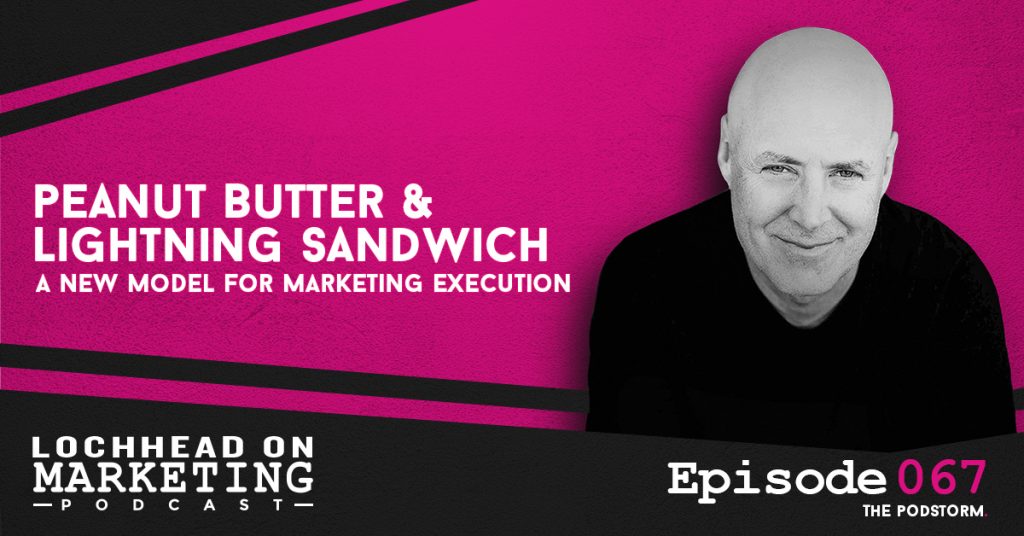
Podcast (lochheadonmarketing): Play in new window | Download (Duration: 14:45 — 10.1MB) | Embed
Subscribe: Apple Podcasts | Spotify | RSS | More
We get a shit ton of marketing messages a day. Some experts say we get 40 to 60,000 messages a day if you include everything — from banners on the internet emails, logos on coffee cups, t-shirts, you name it.
Today, let’s talk about the typical marketing execution. It’s predicated on a model called reaching frequency. It’s a very old idea that states the more people see our brand, hears our message, hears our point of view, the better. Let’s find out what peanut butter and lightning sandwich is and why that’s a new model for marketing execution.
Frequency and Reach
If you’ve ever been to Cuba, you’ll realize how much we are bombarded with advertising in the Western world. In Cuba, there are no billboards, no giant signs, no logos in coffee cups. This only shows that frequency and reach are not applicable to everyone.
“You are either rising above the noise, or you’re just part of the noise.” – Christopher Lochhead
Lightning Strike
Christopher dedicated one episode of Lochhead on Marketing on Peanut Butter vs Lightning Strikes. Lightning strikes are a concentrated set of marketing activities in a very short period of time, against a very tightly defined audience or target market.
“I would rather dominate somebody’s mind space for a day or two, then be mostly irrelevant most of the time.” – Christopher Lochhead
Peanut Butter
Christopher notes the mistake he sees in virtually every marketing plan and every marketing budget. A disproportionate amount of investment and effort is spread equally over time, over product lines, and so forth.
“You can’t stand out if you do that. You’re going to disappear the noise if all you do is reach and frequency inspired.” – – Christopher Lochhead
To hear more about peanut butter and lightning sandwich as the new model for marketing execution, download and listen to this episode.
Bio:
Christopher Lochhead is a #1 Apple podcaster and #1 Amazon bestselling co-author of books: Niche Down and Play Bigger.
He has been an advisor to over 50 venture-backed startups; a former three-time Silicon Valley public company CMO and an entrepreneur.
Furthermore, he has been called “one of the best minds in marketing” by The Marketing Journal, a “Human Exclamation Point” by Fast Company, a “quasar” by NBA legend Bill Walton and “off-putting to some” by The Economist.
In addition, he served as a chief marketing officer of software juggernaut Mercury Interactive. Hewlett-Packard acquired the company in 2006, for $4.5 billion.
He also co-founded the marketing consulting firm LOCHHEAD; was the founding CMO of Internet consulting firm Scient, and served as head of marketing at the CRM software firm Vantive. яндекс
We hope you enjoyed this episode of Lochhead on Marketing™! Christopher loves hearing from his listeners. Feel free to email him, connect on Facebook, Twitter, Instagram, and subscribe on iTunes! You may also subscribe to his newsletter,The Difference, for some amazing content.
066 Questions and Cocktails: FB Live Q & A (Part 8) | Marketing PodStorm #28
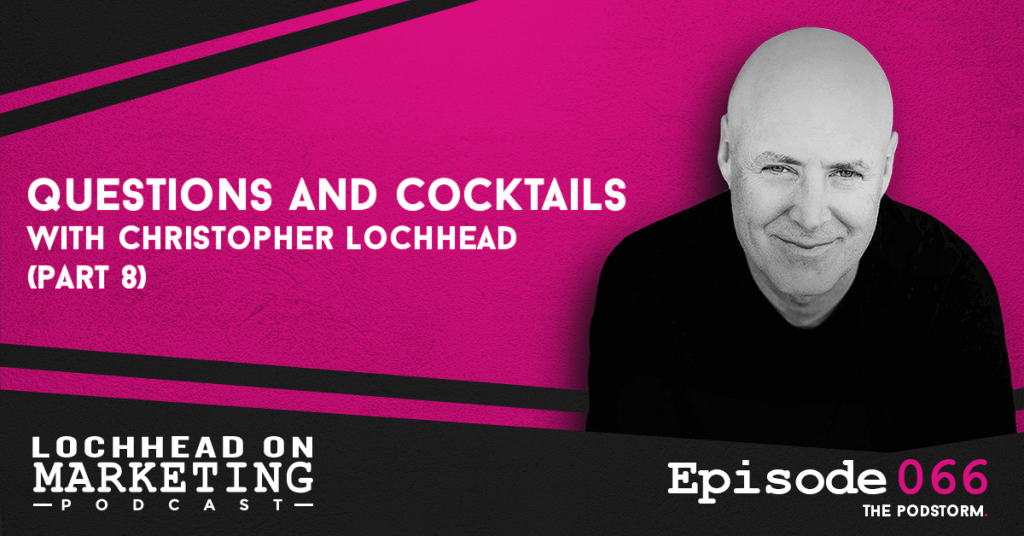
Podcast (lochheadonmarketing): Play in new window | Download (Duration: 20:51 — 14.3MB) | Embed
Subscribe: Apple Podcasts | Spotify | RSS | More
During the PodStorm, we’re doing a live Facebook Question and Answer session, every Friday, 11:30 a.m. PST. We are now on our last week for PodStorm Q&A and we hope to hear from you if you want us to do more live Q&As!
Today, podcast living legend Jason DeFillippo of Grumpy Old Geeks joins us to answer some questions about the importance of internal communications, how public relations and investor relations should work together, and a whole lot more!
Importance of Internal Communications
One listener asked about Christopher’s thoughts on the importance of internal communications and what function inside the company should own it. He narrated how Steve Jobs is the perfect example of this and how his words “there are no phenomenal products in our pipeline” was a self-fulfilling prophecy.
“I think the role of marketing internally is at least equal to the value externally. In some ways more, when people pick up a newspaper or read something online, and they hear, for example, your CEO talking about the company’s mission, or talking about a new product that you just launched, and how it’s going to transform the category and make a difference to a giant number of people, things along those lines are my favorite examples.” – Christopher Lochhead
Public Relations and Investor Relations
Christopher shares candidly that IR and PR, Investor Relations and Public Relations need to be deeply connected. Although it is highly unusual to have IR in marketing since it is always in Finance. However, Christopher shares some instances where Finance would find the Marketing team handy.
“The best CFO I know are way more than accountants. They’re strategic minds. They’re great at mergers and acquisitions and operations. So a lot of companies, if they’re smart, have a very big, big, big time CFO, and I think that’s, particularly if you’re planning on going public.” – Christopher Lochhead
When do we change the logo?
Unless it’s ugly and bad, Christopher believes changing the logo is a strategic mistake, particularly in your first six months. It sends a message to a lot of people that you are tinkering with the creative, as opposed to getting deep in the business.
“You don’t want to be seen as the moron who’s like tinkering with the colors. When there’s some big problem that needs to get addressed. Make sure we’re getting on with the business at hand. You want to be seen as somebody who’s deep in the business, making a giant difference, particularly for the field sales organization, and then the product and engineering organization.” – Christopher Lochhead
To hear more about the Facebook Live Q&A with Christopher Lochhead, with Jason DeFillippo, download and listen to this episode.
Bio:
Christopher Lochhead is a #1 Apple podcaster and #1 Amazon bestselling co-author of books: Niche Down and Play Bigger.
He has been an advisor to over 50 venture-backed startups; a former three-time Silicon Valley public company CMO and an entrepreneur.
Furthermore, he has been called “one of the best minds in marketing” by The Marketing Journal, a “Human Exclamation Point” by Fast Company, a “quasar” by NBA legend Bill Walton and “off-putting to some” by The Economist.
In addition, he served as a chief marketing officer of software juggernaut Mercury Interactive. Hewlett-Packard acquired the company in 2006, for $4.5 billion.
He also co-founded the marketing consulting firm LOCHHEAD; was the founding CMO of Internet consulting firm Scient, and served as head of marketing at the CRM software firm Vantive.
We hope you enjoyed this episode of Lochhead on Marketing™! Christopher loves hearing from his listeners. Feel free to email him, connect on Facebook, Twitter, Instagram, and subscribe on iTunes! You may also subscribe to his newsletter, The Difference, for some amazing content.
065 Questions and Cocktails: FB Live Q & A (Part 7) | Marketing PodStorm #27
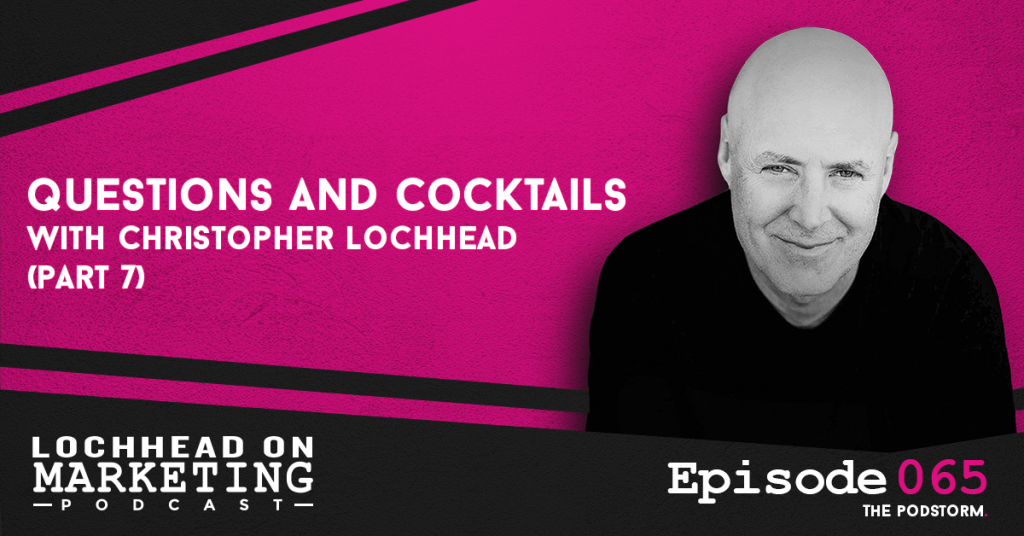
Podcast (lochheadonmarketing): Play in new window | Download (Duration: 18:53 — 13.0MB) | Embed
Subscribe: Apple Podcasts | Spotify | RSS | More
During the PodStorm, we’re doing a live Facebook Question and Answer session, every Friday, 11:30 a.m. PST. We are now on our last week for PodStorm Q&A and we hope to hear from you if you want us to do more live Q&As!
Today, podcast living legend Jason DeFillippo of Grumpy Old Geeks joins us to answer some questions about social cause marketing, lightning strikes, and a whole lot more!
What have you learned after Calling For Unity?
Christopher shares that he received a number of backlashes after he called for unity on his post A Call For Unity. Likewise, he also received a lot of hugs and support for his cause. This is expected as he believes when try to do something as positive and warm-hearted as possible, you still are going to piss people off.
“The reality is when you say anything, topics like racism, or the police, or society or anything that anybody else might consider political, you’re going to piss some people off. But that said, what I’ll tell you is, I don’t think I’ve ever done anything that got such an extraordinary overwhelming positive response.” – Christopher Lochhead
Can you recap, what is a lightning strike?
Christopher gave a definition and description of what lightning strike is, for new listeners. We live in a world today where we get between 40 to 60,000 marketing messages a day. Reach and frequency is virtually undoable for anybody today, even the biggest marketers.
“A lightning strike is about — rather than spreading peanut butter reach and frequency style — we pick maybe one, two, or at most three times a year, a big company might do one a quarter, but something in that range, where for a few days or a week, we are going to go big. If you are in our target audience, our demographic, you are going to hear from us. You are going to know where they are. The thinking is, ‘I’d rather be deeply present in front of my core audience, my core target customer for a short period of time and own their mind space for that short period of time than disappear into the noise all of the time.’” – Christopher Lochhead
CEO and CFO don’t believe in marketing
The question, which has been asked recurrently, was answered in a different light. Christopher made sure to snide in some personal stories which you definitely need to hear.
“Get out. There’s no resolving this. There’s no strategy. I’ve tried this a million times in my life, it’s like, we’ll just convince these guys to get it with marketing, we’ll get them to read such and such a book, or take such and such. They’re just some people who think that marketing is bullshit and not worth very much. If you’re at a company run by executives like that, you’re at a deep, deep disadvantage.” – Christopher Lochhead
To hear more about the Facebook Live Q&A with Christopher Lochhead, with Jason DeFillippo, download and listen to this episode.
Bio:
Christopher Lochhead is a #1 Apple podcaster and #1 Amazon bestselling co-author of books: Niche Down and Play Bigger.
He has been an advisor to over 50 venture-backed startups; a former three-time Silicon Valley public company CMO and an entrepreneur.
Furthermore, he has been called “one of the best minds in marketing” by The Marketing Journal, a “Human Exclamation Point” by Fast Company, a “quasar” by NBA legend Bill Walton and “off-putting to some” by The Economist.
In addition, he served as a chief marketing officer of software juggernaut Mercury Interactive. Hewlett-Packard acquired the company in 2006, for $4.5 billion.
He also co-founded the marketing consulting firm LOCHHEAD; was the founding CMO of Internet consulting firm Scient, and served as head of marketing at the CRM software firm Vantive.
We hope you enjoyed this episode of Lochhead on Marketing™! Christopher loves hearing from his listeners. Feel free to email him, connect on Facebook, Twitter, Instagram, and subscribe on iTunes! You may also subscribe to his newsletter, The Difference, for some amazing content.
064 The Secret Hack To Becoming A #1 Author & Podcaster, In 13 Minutes or Less | Marketing PodStorm 26
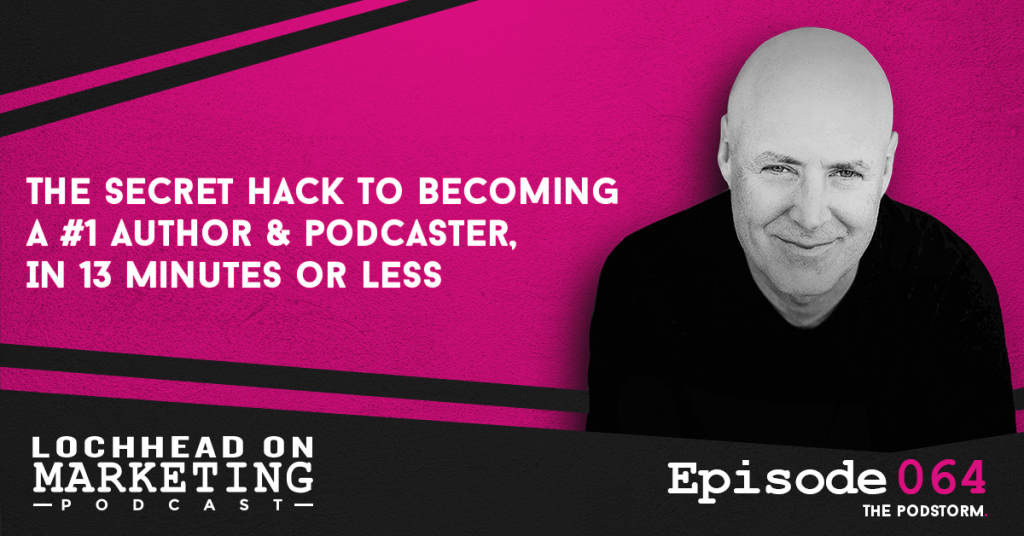
Podcast (lochheadonmarketing): Play in new window | Download (Duration: 23:15 — 16.0MB) | Embed
Subscribe: Apple Podcasts | Spotify | RSS | More
In this episode, Christopher Lochhead shares a secret hack to become a #1 author and podcaster in 13 minutes or less. Basically, the secret hack is to hire a 16-year-old Tiktoker and let her create funny content for you. You can also explore posting provocative poses, drinking provocative drinks, and being in provocative places.
If you know Christopher well, you will be certain, there is sarcasm in the above paragraph. Today, he will discuss the real deal on reaching the top of your game. It doesn’t include any secret hack or how-to of sorts, but a real-life narration of his personal experiences on how he did it.
No Secret Hack
There is no secret hack. In Christopher’s case, he did not experience a major breakthrough or a celebrity moment that kickstarted his career. We usually see influencers who brag about being on the “Oprah List” or have guested on big podcast shows. Christopher advises you that this is not the only way to the top.
“In my life, but I’ve always been somebody that’s had to carry a lot of water to get any kind of a result. So the answer that I’m going to share with you today is both not satisfying — because there is no secret — and fantastic at the same time. I’m going to tell you right off the top, it’s disappointing and empowering.” – Christopher Lochhead
Three Things That Matter
There are three things that matter if you want to become a content person. Number one category design. What’s the category? What makes you different versus better? So that category design needs to get done for your book for your podcast for you.
Second, you got to do the work. Christopher cites the specifics on this point and third is you have to have a radically generous mindset.
No Self-Made People
Christopher also talks about how we can achieve success: that is through the help of other people. There are no self-made people because a huge chunk of success comes from customers, fans, family and friends who share your product or service (word of mouth).
Aside from word-of-mouth, Christopher also discusses the importance of paid advertising.
“There’s no secret. You got to do the work. You got to invest. You’re going to have to do some paid marketing. Some of the top digital celebrities out there want you to believe that they just became that way with no marketing at all because they have legendary products,” – Christopher Lochhead
To listen to the real secret hack to becoming a #1 author and top podcaster, download and listen to this episode.
Bio:
Christopher Lochhead is a #1 Apple podcaster and #1 Amazon bestselling co-author of books: Niche Down and Play Bigger.
He has been an advisor to over 50 venture-backed startups; a former three-time Silicon Valley public company CMO and an entrepreneur.
Furthermore, he has been called “one of the best minds in marketing” by The Marketing Journal, a “Human Exclamation Point” by Fast Company, a “quasar” by NBA legend Bill Walton and “off-putting to some” by The Economist.
In addition, he served as a chief marketing officer of software juggernaut Mercury Interactive. Hewlett-Packard acquired the company in 2006, for $4.5 billion.
He also co-founded the marketing consulting firm LOCHHEAD; was the founding CMO of Internet consulting firm Scient, and served as head of marketing at the CRM software firm Vantive.
We hope you enjoyed this episode of Lochhead on Marketing™! Christopher loves hearing from his listeners. Feel free to email him, connect on Facebook, Twitter, Instagram, and subscribe on iTunes! You may also subscribe to his newsletter, The Difference, for some amazing content.
063 The Magic Triangle | Marketing PodStorm 25
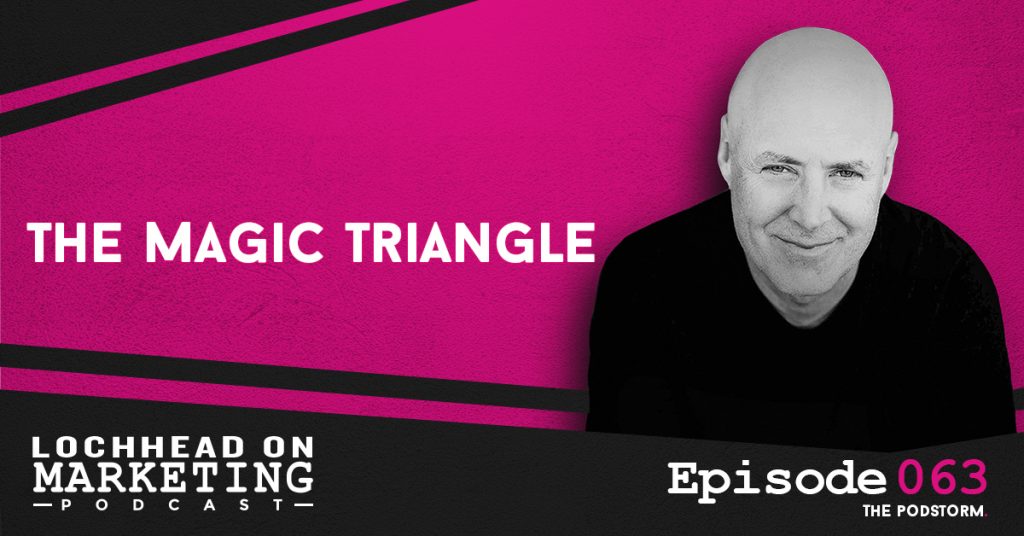
Podcast (lochheadonmarketing): Play in new window | Download (Duration: 9:01 — 6.2MB) | Embed
Subscribe: Apple Podcasts | Spotify | RSS | More
In this episode, let’s talk about the magic triangle — how the company, the product, and the category come together to make you the category queen or category king in your market category.
Product Design
Product design is the purposeful building of a product and an experience that solves a problem. Most companies, though, opt for a product-market fit. Christopher believes it a dangerous idea because it insinuates that there’s a market out there who would automatically consume whatever is offered to them.
“Typically what happens is: entrepreneurs start with a problem or something they’re working on or tinkering with, and they get obsessed with the thing. That of course, is the product.” – Christopher Lochhead
Company Design
Company design is the purposeful creation of a business model, and an organization with culture, a point of view that fits the category. In a recent episode of Christopher about BHAGs, you’ll see how a point of view with a big hairy audacious goal can come together and become a powerful motivator, driver, and unifier of culture.
“If you get category design, right, and you lock and load on a provocative point of view, that is deeply rooted in something you care about, such that you, your co-founders, your colleagues, your co-workers, the other executives in the company, etc. are on a mission centered around that point of view, it changes culture.” – Christopher Lochhead
Category Design
Category design is the mindful creation and development of a new market category. Successful category design will result in the consumers demanding the product from you and crowning you the queen.
“In marketing terms, category design is the ultimate air wars as distinct from ground wars. It’s about winning the war for public opinion. It’s about teaching the world to abandon something old and embrace something new. Category design builds the profile of the space while drawing attention to the company. Legendary companies market the category first and the company second.” – – Christopher Lochhead
To hear more about the magic triangle and specific examples for product, company, and category design, download and listen to this episode.
Bio:
Christopher Lochhead is a #1 Apple podcaster and #1 Amazon bestselling co-author of books: Niche Down and Play Bigger.
He has been an advisor to over 50 venture-backed startups; a former three-time Silicon Valley public company CMO and an entrepreneur.
Furthermore, he has been called “one of the best minds in marketing” by The Marketing Journal, a “Human Exclamation Point” by Fast Company, a “quasar” by NBA legend Bill Walton and “off-putting to some” by The Economist.
In addition, he served as a chief marketing officer of software juggernaut Mercury Interactive. Hewlett-Packard acquired the company in 2006, for $4.5 billion.
He also co-founded the marketing consulting firm LOCHHEAD; was the founding CMO of Internet consulting firm Scient, and served as head of marketing at the CRM software firm Vantive.
We hope you enjoyed this episode of Lochhead on Marketing™! Christopher loves hearing from his listeners. Feel free to email him, connect on Facebook, Twitter, Instagram, and subscribe on iTunes! You may also subscribe to his newsletter,The Difference, for some amazing content.
062 How to be a Category Designer | Marketing PodStorm 24
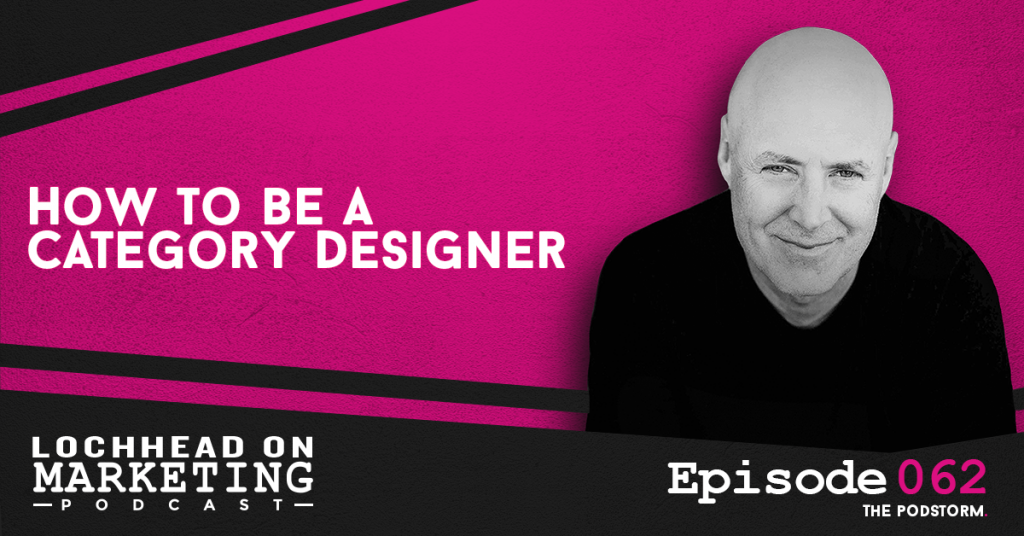
Podcast (lochheadonmarketing): Play in new window | Download (Duration: 16:21 — 11.2MB) | Embed
Subscribe: Apple Podcasts | Spotify | RSS | More
In this episode, an incredibly important topic, we discuss how to be a category designer. Moreover, we dig into how to become the person that drives a new strategy for your company and introduces the world to something new, something different, something that makes a giant difference.
Category Design: A Discipline
Christopher narrates a portion of the book Play Bigger which states: “Category design is the discipline of creating and developing a new market category and conditioning the market so it will demand your solution and crown your company as its King.”
“A category designer leads a company-wide strategy with the goal of becoming a category Queen of high value, high growth market category of your choosing.” – Christopher Lochhead
In the same book, Christopher and his co-authors did research and found out that in the tech space, one company takes two-thirds of the economics. As more and more companies behave like tech companies, more and more companies are taking two-thirds of the market.
Category Design: All-Encompassing
Category design is a discipline and for many a career. Christopher has mastered this discipline and has become a huge differentiator for his career as a 3x CMO and as an advisor.
“A category designer brings together all the critical functions in a business — the key strategic activities across your company, aligning sales, marketing, product development/engineering, and even HR — with the single focus of becoming a category queen.” – Christopher Lochhead
Category Design: The Drivers of Change
Category design is a collaborative effort between the CEO and all other Chief Officers of the company. Christopher digs deep into the process and how to go about designing your category.
“Now, category designers bring together the whole business. They help create a blueprint, a visual representation that generates a belief that you have a solution to an urgent problem. So they build this blueprint. They are the creators, and at least co-authors, if not primary authors of the provocative and engaging POV point of view that you’re now going to evangelize.” – Christopher Lochhead
To know more about becoming a category designer, download and listen to this episode.
Bio:
Christopher Lochhead is a #1 Apple podcaster and #1 Amazon bestselling co-author of books: Niche Down and Play Bigger.
He has been an advisor to over 50 venture-backed startups; a former three-time Silicon Valley public company CMO and an entrepreneur.
Furthermore, he has been called “one of the best minds in marketing” by The Marketing Journal, a “Human Exclamation Point” by Fast Company, a “quasar” by NBA legend Bill Walton and “off-putting to some” by The Economist.
In addition, he served as a chief marketing officer of software juggernaut Mercury Interactive. Hewlett-Packard acquired the company in 2006, for $4.5 billion.
He also co-founded the marketing consulting firm LOCHHEAD; was the founding CMO of Internet consulting firm Scient, and served as head of marketing at the CRM software firm Vantive.
We hope you enjoyed this episode of Lochhead on Marketing™! Christopher loves hearing from his listeners. Feel free to email him, connect on Facebook, Twitter, Instagram, and subscribe on iTunes! You may also subscribe to his newsletter, The Difference, for some amazing content.
166 Radical Business Transformation | Doug Merritt CEO of Splunk
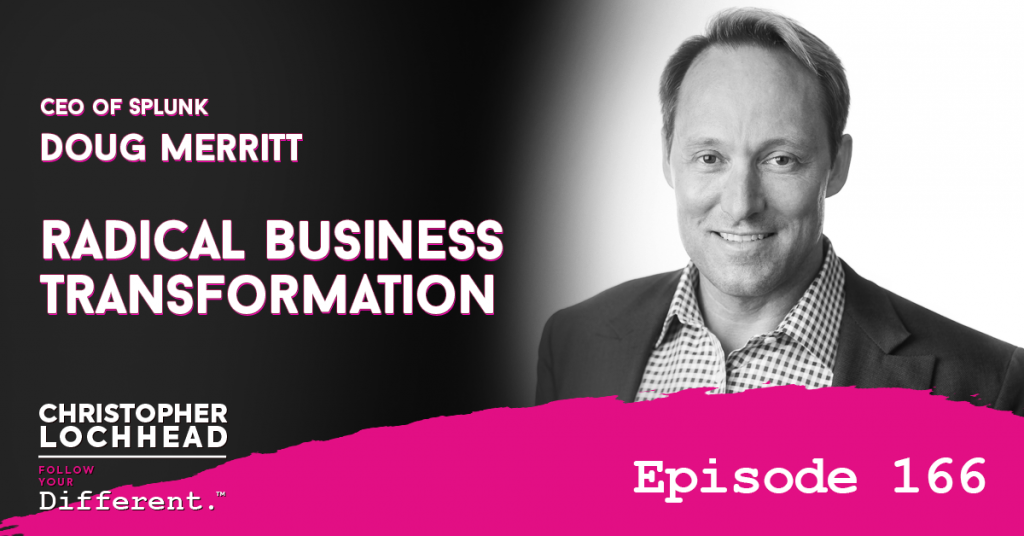
Podcast: Play in new window | Download (Duration: 36:28 — 25.0MB) | Embed
Subscribe: Apple Podcasts | Spotify | Pandora | RSS | More
Today, we speak with a very special guest about a critical topic: radical transformation. Doug Merritt of Splunk joins us for a conversation about Splunk’s journey, their radical technology, delivery model, and business model transformation.
Pay special attention to Doug’s depth and breadth of detail about their business, their technology modeling stack, business model, and their financial model. I think you’ll find it fascinating to hear what it really takes to be the CEO of a high-growth, high impact company.
Radical Transformation
Christopher shares that almost all aspects of the world are going through a transformation right now. Doug agrees about the uncertainties and changes in our environment. Likewise, he shares how Splunk has undergone and is continuing the process of radical transformation.
“We targeted over four years ago, four simultaneous transformations. First was shifting our business model. The second was completely rethinking and delivering a different product portfolio. The third was the market shift. Fourth, complete rethinking and reimplementation of our business processes and infrastructure technology. It’s been a lot of work. We’re not done. We’re not done yet, but we continue to make good progress.” – Doug Merritt
Risk and Reversibility
Doug shares an important point if you plan to have a radical transformation, that is to consider risks and reversibility. He relates sheltering in place or shifting to a work-from-home arrangement as a reversible decision. On the other hand, transforming the business model or pricing has an irreversible effect, or would entail a lot of work to reverse the risks.
“Jeff Bezos talks about it and I think it’s very catchy: is your change a one way door or a two way door? Obviously a one way door, you may get back in, but you have to get an axe and maybe a wrecking ball. It’s going to be a lot of pain and effort to get back in to a door like that. A revolving door in a hotel you go out, maybe you don’t like it, you can choose to go back in. It’s easier to reverse.” – Doug Merritt
Growing Splunk
Doug shares how fortunate the Splunk team is while undergoing a radical transformation. They initially have revenues and drastically improved it while transitioning, and while maintaining their public status. They also continue to acquire companies, such as their recent $1B SignalFx.
“To be able to take on that degree of change of disruption, of difficulty and somehow still over-deliver versus expectations, I think that we are in a category of one right now, but I’m hoping that there are more that come behind us.” – Doug Merritt
To hear more about Doug Merritt, CEO of Splunk and more about radical transformation, download and listen to this episode.
Bio:
Doug Merritt has served as our President and Chief Executive Officer and a member of our Board since 2015.
Previously, Merritt served as Senior Vice President of Field Operations at Splunk from 2014 to 2015.
Prior to joining Splunk, Merritt served as Senior Vice President of Products and Solutions Marketing at Cisco Systems, Inc., a networking company, from 2012 to 2014.
From 2011 to 2012, he served as Chief Executive Officer of Baynote, Inc., a behavioral personalization and marketing technology company.
Previously, Merritt served in a number of executive roles and as a member of the extended Executive Board at SAP A.G., from 2005 to 2011.
From 2001 to 2004, Merritt served as Group Vice President and General Manager of the Human Capital Management Product Division at PeopleSoft Inc. (acquired by Oracle Corporation). He also co-founded and served as Chief Executive Officer of Icarian, Inc. (since acquired by Workstream Corp.), a cloud-based company, from 1996 to 2001.
Merritt holds a B.S. from The University of the Pacific in Stockton, California.
Links:
We hope you enjoyed this episode of Follow Your Different™! Christopher loves hearing from his listeners. Feel free to email him, connect on Facebook, Twitter, Instagram and subscribe on iTunes!
061 Market Categories Are Not Like The Weather | Marketing PodStorm 23
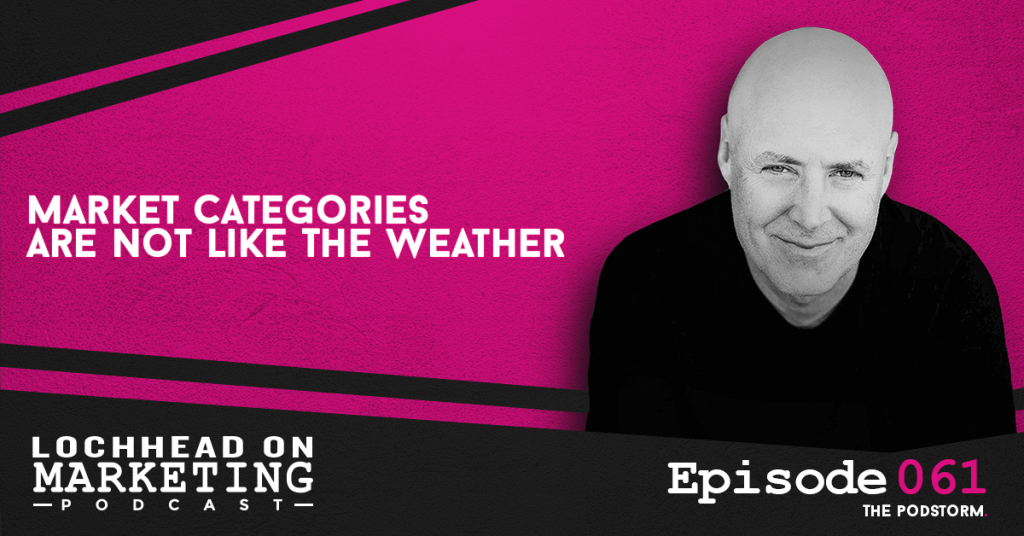
Podcast (lochheadonmarketing): Play in new window | Download (Duration: 11:44 — 8.1MB) | Embed
Subscribe: Apple Podcasts | Spotify | RSS | More
Have you ever noticed how people talk about market categories? People involved with the business perpetuate one of the biggest lies in business. As published in a lot of major publications, these “business writers” say market categories are like the weather, we cannot control it.
Today, we will dig into why Christopher thinks its a lie standing in plain sight. We’re going to talk about how we can actually design market categories and not be the victim of them.
This Kind of Paradigm
Christopher cites several examples stating that market categories are not like the weather.
Here’s a WSJ story about IBM from Oct 2019: “IBM’s overall revenue still slipped by 4% to $18.03 billion in the quarter, coming in below Wall Street’s estimates and led mainly by the slowdown in global technology services.”
“You and I can’t do shit about the weather but we can, in this case, the global technology services market category.” – Christopher Lochhead
Here is Why it’s Bullshit
There was zero demand for bubble gum until Walter Diemer created both the product and the category in 1928. Today, bubble gum is a $28.9 Billion category.
Another example is the e-sports category. Statista.com cites “in 2018, the global eSports market was nearly 865 million U.S. dollars and will reach 1.79 billion U.S. dollars in 2022. Andy Stout suggests that 106 million people viewed the 2017 Worlds Esports competition eSports scholarships grew an astonishing 480% in 2018. The final prize pool for 2016 League of Legends World Championship, was $6.7 million.
Before Marc Benioff, founder of Salesforce, there was no cloud. In 2019 it was a $266.0 billion category and it’s growing at 15%. Market categories are not the weather. Every category exists because someone designed it.
What’s The Point
Christopher could give you a million examples. We are living in a cocoon time and somebody is designing or redesigning the future of your market category. The question for you is, is it you?
“Our businesses are not victims, we are not victims of the market. We have the ability to affect how the market categories behave. Legends, by definition, do not accept the way it is.” – Christopher Lochhead
To know more about why market categories are not like the weather, download and listen to this episode.
Bio:
Christopher Lochhead is a #1 Apple podcaster and #1 Amazon bestselling co-author of books: Niche Down and Play Bigger.
He has been an advisor to over 50 venture-backed startups; a former three-time Silicon Valley public company CMO and an entrepreneur.
Furthermore, he has been called “one of the best minds in marketing” by The Marketing Journal, a “Human Exclamation Point” by Fast Company, a “quasar” by NBA legend Bill Walton and “off-putting to some” by The Economist.
In addition, he served as a chief marketing officer of software juggernaut Mercury Interactive. Hewlett-Packard acquired the company in 2006, for $4.5 billion.
He also co-founded the marketing consulting firm LOCHHEAD; was the founding CMO of Internet consulting firm Scient, and served as head of marketing at the CRM software firm Vantive.
We hope you enjoyed this episode of Lochhead on Marketing™! Christopher loves hearing from his listeners. Feel free to email him, connect on Facebook, Twitter, Instagram, and subscribe on iTunes! You may also subscribe to his newsletter, The Difference, for some amazing content.

